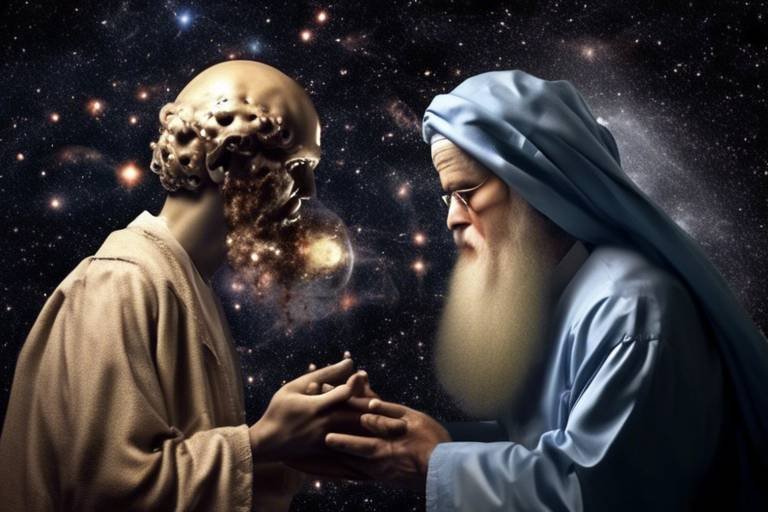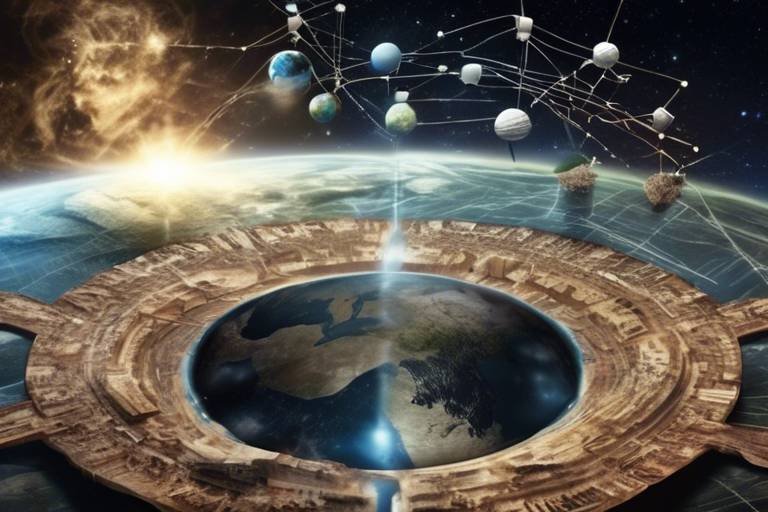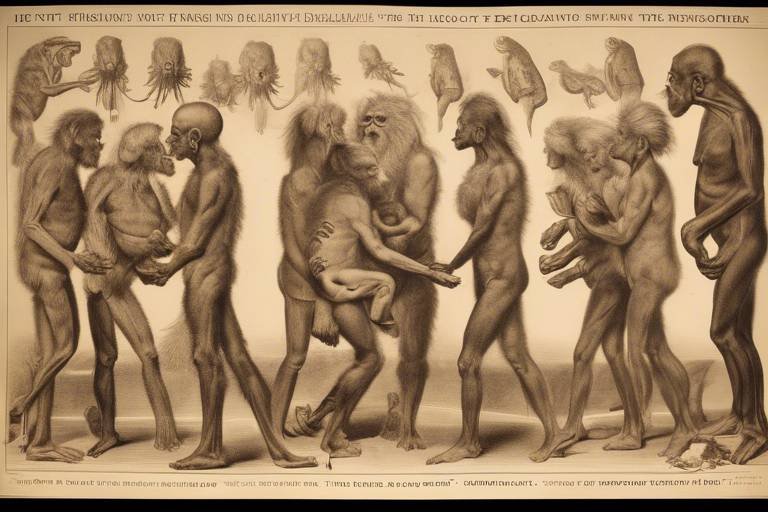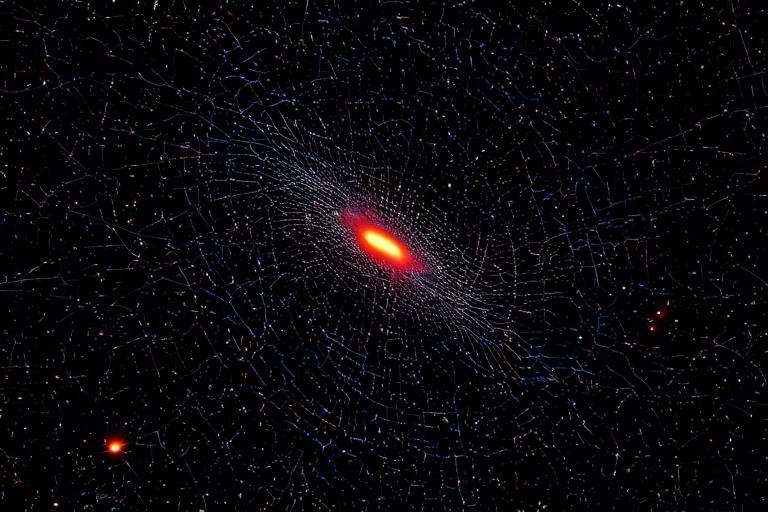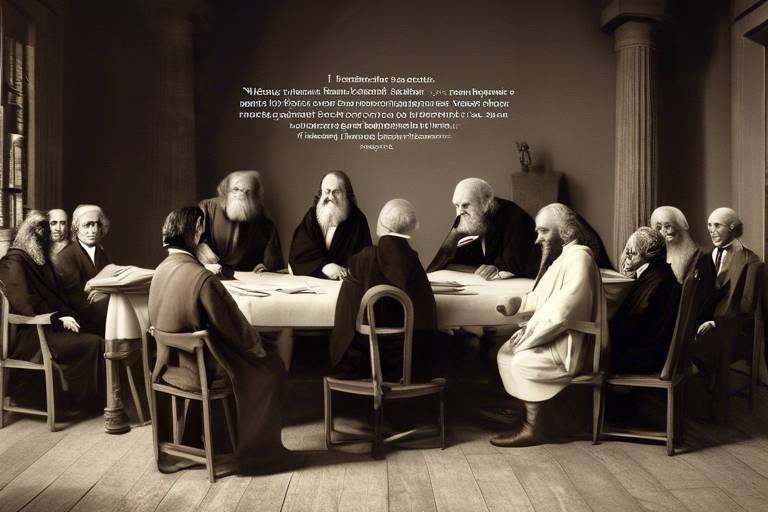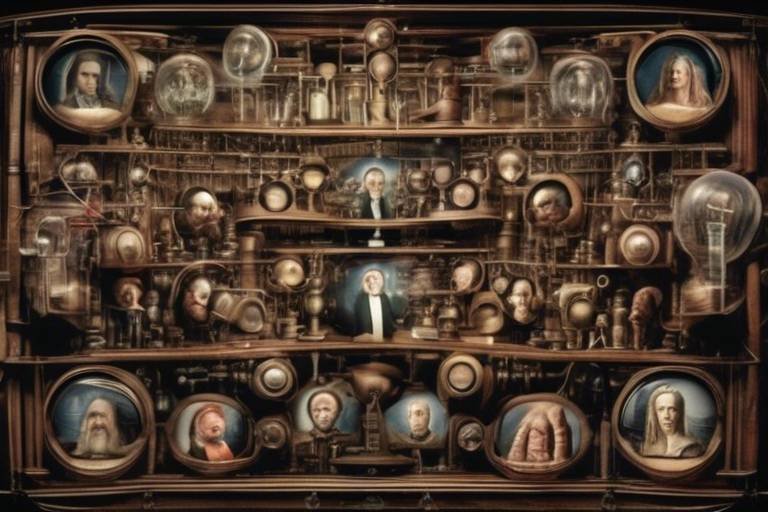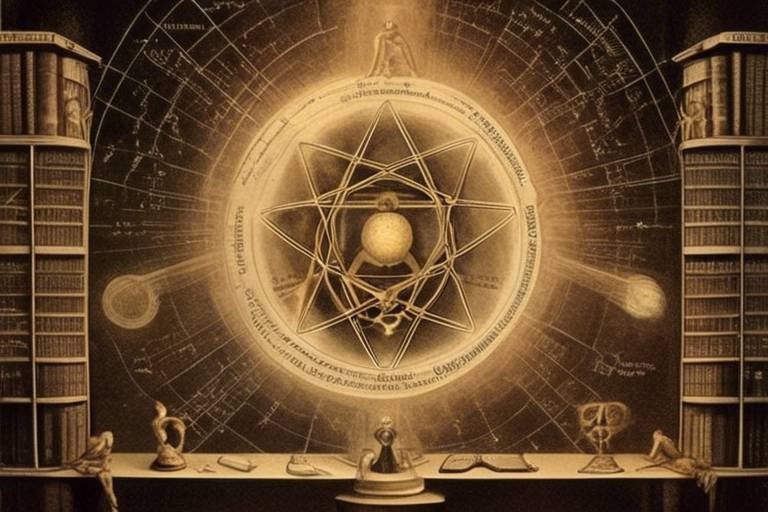Science versus Religion - Philosophical Perspectives
The debate between science and religion has been a cornerstone of human thought for centuries, igniting passionate discussions that delve deep into our understanding of existence. At its core, this discourse is not merely about facts and beliefs; it's about the fundamental questions that define our reality. Are we products of a random universe, or is there a divine purpose behind our existence? This article aims to explore the intricate dance between these two pillars of human understanding, examining their historical contexts, philosophical foundations, and the ethical implications they carry.
To grasp the nuances of the science-religion debate, one must first look back at the historical relationship that has shaped their interaction over the centuries. From the ancient civilizations that revered nature as a divine force to the Enlightenment's scientific revolution, the evolution of thought has been marked by pivotal events. The trial of Galileo, who dared to challenge the geocentric view of the universe, is a prime example of the friction between scientific inquiry and religious doctrine. This historical backdrop sets the stage for understanding how these two realms have influenced each other and the continued evolution of thought.
At the heart of the debate lies the philosophical underpinnings of both science and religion. Science, grounded in empiricism, seeks to understand the world through observation and experimentation. It operates on the premise that knowledge is derived from evidence, constantly evolving as new discoveries are made. In contrast, religion often leans on faith, spiritual experiences, and ancient texts that provide a framework for understanding life's mysteries. This divergence raises profound questions about the nature of knowledge itself.
When we explore the different epistemological approaches of science and religion, we find that each defines and validates knowledge in unique ways. Science champions the idea that knowledge must be observable and testable, while religion emphasizes inner conviction and the acceptance of truths that may not be empirically proven. This divergence can lead to tension, especially when scientific discoveries challenge long-held religious beliefs.
In the realm of science, empirical evidence serves as the backbone of inquiry. Scientists rely on observation, experimentation, and reproducibility to validate their findings. For instance, the laws of physics are not merely theoretical; they are supported by countless experiments and observations that consistently yield the same results. This rigorous approach has led to remarkable advancements in technology and medicine, showcasing the power of human reasoning and inquiry.
On the other hand, faith in religion is often rooted in personal experience and tradition. It provides a sense of purpose and belonging that empirical evidence cannot always offer. Many religious individuals find meaning in the mysteries of life, viewing faith as a guiding light in a world filled with uncertainties. This reliance on faith can sometimes lead to conflicts with scientific explanations, particularly when scientific findings appear to contradict religious teachings.
The ethical frameworks provided by science and religion also play a significant role in shaping human behavior. Science often adopts a utilitarian approach, focusing on the greatest good for the greatest number. It encourages critical thinking and ethical considerations based on outcomes and consequences. Conversely, religious ethics typically draw from sacred texts and traditions, emphasizing moral behavior based on divine commandments. This divergence in ethical reasoning can lead to rich discussions on morality and human conduct.
The perceived conflicts between science and religion are often highlighted in popular discourse, yet there are also perspectives that advocate for their compatibility. Many thinkers argue that both realms can coexist, enriching our understanding of the universe and our place within it. The challenge lies in finding common ground and fostering dialogue that respects both scientific inquiry and spiritual beliefs.
Throughout history, key scientific discoveries have challenged traditional religious views, prompting individuals and communities to reevaluate their faith. For example, the theory of evolution posed significant questions about the origins of humanity, leading to debates that continue to this day. Such discoveries often serve as catalysts for deeper exploration of both scientific and religious beliefs.
Some thinkers advocate for an integrative approach that harmonizes scientific and religious perspectives. This perspective fosters dialogue and understanding, promoting the idea that science and religion can coexist and complement each other. By recognizing the value in both realms, we can cultivate a more holistic understanding of existence that honors the complexities of human experience.
The science-religion debate significantly influences societal norms, policies, and cultural values. As we navigate contemporary issues such as climate change, healthcare, and technological advancements, the interplay between scientific understanding and religious beliefs becomes increasingly relevant. This impact shapes our collective worldview and informs the decisions we make as a society.
Science education plays a crucial role in shaping public discourse around religious beliefs. As students learn about scientific principles, they may encounter conflicts with their religious upbringing. This intersection of education and belief highlights the importance of fostering environments where open dialogue is encouraged, allowing individuals to explore and reconcile their understanding of the world.
Interestingly, the scientific community is not devoid of religious beliefs. Many renowned scientists navigate both realms, demonstrating that one can be both a believer and a rigorous scientist. This coexistence exemplifies the potential for harmony between science and religion, challenging the notion that the two are inherently opposed.
- Can science and religion coexist?
Yes, many individuals find ways to harmonize their scientific understanding with their religious beliefs. - What are the main conflicts between science and religion?
Conflicts often arise over issues like evolution, the origins of the universe, and ethical implications of scientific advancements. - How can education bridge the gap between science and religion?
Encouraging open dialogue and critical thinking in educational settings can help individuals reconcile differing beliefs.

The Historical Context
The relationship between science and religion has been a complex and evolving narrative throughout human history. From the ancient civilizations where mythology and early scientific thought intertwined, to the Enlightenment era that sparked a profound shift in intellectual paradigms, the dialogue between these two domains has shaped our understanding of the universe. In ancient times, many cultures viewed the cosmos through a religious lens, attributing natural phenomena to divine forces. For instance, the Greeks had gods for nearly every aspect of nature, while early astronomers like Ptolemy constructed geocentric models of the universe that aligned more with religious beliefs than empirical observation.
As we moved into the Middle Ages, the influence of the Church became predominant, often stifling scientific inquiry. The infamous trial of Galileo Galilei in the early 17th century serves as a stark reminder of this tension. Galileo's support for heliocentrism—the idea that the Earth revolves around the Sun—directly contradicted the Church's teachings, leading to his condemnation. This pivotal moment marked a significant clash between scientific discovery and religious doctrine, illustrating how the quest for knowledge can be at odds with established beliefs.
However, the Renaissance ignited a spark of curiosity and questioning that laid the groundwork for modern science. Thinkers such as Isaac Newton and Francis Bacon championed a new approach to understanding the world, emphasizing observation and experimentation over dogma. Their contributions not only advanced scientific thought but also prompted a reevaluation of how humanity perceives its place in the universe.
Throughout the 19th and 20th centuries, the rise of evolutionary theory, spearheaded by Charles Darwin, further challenged traditional religious narratives. The idea that species evolve through natural selection contradicted the creationist views held by many religious groups, leading to heated debates that continue to this day. This period also saw the emergence of various philosophical schools that sought to reconcile or differentiate science and religion, including positivism and existentialism.
In contemporary society, the relationship between science and religion remains dynamic. While some individuals view them as mutually exclusive, others argue for a more integrated approach. Notable figures, such as Albert Einstein, have expressed views that embrace both scientific inquiry and spiritual wonder, suggesting that the two can coexist harmoniously. The historical context of this debate is not merely a tale of conflict; it is also a story of adaptation, resilience, and the ongoing quest for understanding that defines the human experience.

Philosophical Foundations
The philosophical foundations of science and religion are as intricate as they are profound, each offering a unique lens through which we can interpret our existence and the universe at large. Science, grounded in empirical evidence and logical reasoning, seeks to uncover the workings of the natural world. It operates on principles that can be tested, observed, and replicated, creating a framework for understanding that is ever-evolving. On the other hand, religion often delves into the metaphysical, addressing questions of purpose, morality, and the nature of the divine. It provides a narrative that gives meaning to human existence, often relying on faith and spiritual experiences that transcend empirical validation.
At the core of this philosophical divergence lies the concept of knowledge. Science defines knowledge through a lens of skepticism and inquiry, championing the idea that we can only know what we can observe and measure. This is where the scientific method shines, emphasizing a cycle of hypothesis, experimentation, and conclusion that continuously refines our understanding of the world. In contrast, religion approaches knowledge through a different epistemological framework, one that often prioritizes tradition, revelation, and personal experience. This duality raises intriguing questions: Can faith coexist with empirical inquiry? Or are they destined to remain in perpetual conflict?
To further explore the nature of knowledge, we must examine how each domain defines and validates what it considers to be true. Science relies heavily on empiricism, the philosophical stance that knowledge comes primarily from sensory experience. When scientists conduct experiments, they meticulously gather data, analyze results, and draw conclusions based on observable phenomena. This rigorous approach not only enhances our understanding of the physical world but also fosters a culture of questioning and discovery.
Empirical evidence serves as the backbone of scientific inquiry, emphasizing observation and experimentation. For instance, consider how scientists have approached the question of gravity. Through countless experiments and observations, they have developed theories that explain gravitational forces, allowing us to predict how objects will behave under various conditions. This empirical approach is crucial because it allows for a collective understanding that can be built upon over time. The table below illustrates key elements of the scientific method:
| Step | Description |
|---|---|
| Observation | Identifying a phenomenon or problem to study. |
| Hypothesis | Formulating a testable statement or prediction. |
| Experimentation | Conducting tests to gather data and evaluate the hypothesis. |
| Analysis | Interpreting the results to determine if they support or refute the hypothesis. |
| Conclusion | Drawing conclusions based on the analysis and sharing findings. |
In stark contrast, religion often embraces a different approach to knowledge—one that is rooted in faith. Faith is not merely a blind acceptance of beliefs; rather, it can be a deeply personal conviction that shapes one’s understanding of the world. For many, spiritual experiences and revelations play a crucial role in defining their beliefs. This reliance on faith raises questions about the nature of truth: Is truth something that can be measured, or is it something that exists beyond our physical comprehension? The following points encapsulate the essence of faith in religion:
- Faith often transcends empirical evidence, providing a sense of purpose and belonging.
- Religious beliefs can offer comfort in times of uncertainty and existential questioning.
- Spiritual experiences are subjective and can vary widely among individuals.
Ultimately, the philosophical foundations of science and religion present us with a rich tapestry of thought and inquiry. While science seeks to explain the 'how' of the universe, religion often grapples with the 'why.' This interplay between the two domains invites us to ponder deeper questions about existence and our place within it, fostering a dialogue that can lead to greater understanding and respect for differing viewpoints.
- Can science and religion coexist? Yes, many individuals find ways to integrate both perspectives into their worldview, seeing them as complementary rather than conflicting.
- What role does faith play in scientific inquiry? While faith is not a component of scientific methodology, many scientists hold personal beliefs that inform their ethical considerations and motivations.
- How do ethical frameworks differ between science and religion? Science often relies on empirical evidence to inform ethical decisions, while religion may base its moral principles on sacred texts and spiritual beliefs.

The Nature of Knowledge
When we dive into the nature of knowledge, we find ourselves at the crossroads of two powerful realms: science and religion. Each of these domains approaches knowledge from distinct angles, shaping our understanding of reality in unique ways. Science, with its roots in empiricism, relies heavily on observation and experimentation. It seeks to uncover truths about the natural world through rigorous testing and validation. Think of it as a detective unraveling a mystery, gathering clues and evidence to piece together the bigger picture. On the other hand, religion often embraces a more spiritual and introspective approach, where knowledge is derived from faith, tradition, and personal experiences. This can be likened to an artist interpreting a profound emotion, where the truth is not always visible but felt deeply within.
To further explore this fascinating dichotomy, let’s consider how each discipline defines and validates knowledge. For science, the process is systematic and structured. It operates on the principle that knowledge must be testable and repeatable. This means that scientific knowledge is constantly evolving, as new discoveries can challenge and refine existing theories. For instance, the transition from Newtonian physics to Einstein's theory of relativity fundamentally changed our understanding of time and space, showcasing how scientific knowledge is not static but rather a dynamic landscape.
In contrast, religion often holds that knowledge can transcend empirical evidence. It is not uncommon for religious beliefs to be rooted in scriptural texts, ancient traditions, or personal revelations. This kind of knowledge is often accepted on the basis of faith, which can be a powerful force in shaping one's worldview. For many, faith provides a sense of purpose and understanding that scientific inquiry may not fully address. While science asks "how" things happen, religion often seeks to answer the "why" behind our existence. This distinction raises intriguing questions about the validity of knowledge: Is knowledge derived from faith any less valid than that which is obtained through scientific inquiry?
To illustrate the contrast between these epistemological approaches, consider the following table:
| Aspect | Science | Religion |
|---|---|---|
| Basis of Knowledge | Empirical Evidence | Faith and Spiritual Experience |
| Method of Validation | Observation and Experimentation | Tradition and Personal Revelation |
| Nature of Truth | Dynamic and Evolving | Timeless and Absolute |
| Focus | Natural World | Spiritual and Moral Guidance |
This table highlights the fundamental differences in how science and religion approach knowledge. While science is grounded in the physical and observable, religion often navigates the metaphysical, providing frameworks for understanding morality, purpose, and existence beyond what can be measured or seen.
Ultimately, the interplay between these two forms of knowledge can lead to rich discussions and deeper insights. Many individuals find themselves navigating both worlds, seeking answers that resonate on both intellectual and spiritual levels. This duality can foster a more holistic understanding of our existence, encouraging conversations that bridge the gap between science and religion.
- Can science and religion coexist? Yes, many people find value in both realms, appreciating how they can complement each other.
- What is the main difference between scientific knowledge and religious knowledge? Scientific knowledge is based on empirical evidence, while religious knowledge is often based on faith and spiritual experiences.
- How do scientific discoveries affect religious beliefs? Scientific discoveries can challenge traditional beliefs, prompting individuals to reevaluate their faith in light of new evidence.
- Is faith a valid form of knowledge? For many, faith provides a profound understanding of life and existence, offering insights that empirical evidence cannot fully capture.

Empiricism in Science
Empiricism is the cornerstone of scientific inquiry, a philosophy that emphasizes the role of observation and experience in the acquisition of knowledge. At its core, empiricism posits that knowledge is derived from sensory experience, which is why scientists meticulously observe the world around them, conduct experiments, and gather data. This method stands in stark contrast to other forms of knowledge acquisition, such as rationalism, which relies heavily on reasoning and innate ideas. In the realm of science, empiricism serves not just as a method but as a guiding principle that drives researchers to seek evidence before drawing conclusions.
Consider the scientific method, a systematic approach that embodies empiricism. It involves several steps: observation, hypothesis formulation, experimentation, data collection, and analysis. Each step is crucial and builds on the previous one, creating a robust framework for understanding the natural world. For example, when scientists observe a phenomenon, they don't just take it at face value; they ask questions, formulate hypotheses, and then design experiments to test those hypotheses. This rigorous process helps to eliminate bias and ensures that conclusions are based on solid evidence rather than personal beliefs or preconceived notions.
Another fascinating aspect of empiricism is its reliance on repeatability. In science, a finding is only considered valid if it can be replicated by others. This principle ensures that scientific knowledge is not just a collection of isolated anecdotes but a cohesive body of evidence. When a scientist makes a discovery, other researchers are encouraged to conduct their own experiments to verify the results. This collaborative effort not only strengthens the reliability of scientific findings but also fosters a spirit of inquiry and skepticism, which is vital for the advancement of knowledge.
To illustrate the power of empiricism, let’s take a look at a few key scientific discoveries that were made possible through empirical methods:
| Discovery | Scientist | Year | Significance |
|---|---|---|---|
| Gravity | Isaac Newton | 1687 | Formulated laws of motion and universal gravitation based on empirical observations. |
| Germ Theory | Louis Pasteur | 1860s | Established that microorganisms cause disease through experimental evidence. |
| Relativity | Albert Einstein | 1905 | Revolutionized physics with theories validated by empirical experiments and observations. |
In summary, empiricism is not merely a methodological approach; it is a philosophy that has propelled scientific advancements and shaped our understanding of the universe. By prioritizing observation and evidence, science has been able to unravel complex mysteries and challenge long-held beliefs. The beauty of empiricism lies in its ability to adapt and evolve, allowing science to grow and refine its theories as new evidence emerges. This dynamic nature of scientific inquiry not only enriches our knowledge but also reinforces the importance of questioning and exploring the world around us.
- What is empiricism? Empiricism is a philosophical approach that emphasizes knowledge gained through sensory experience and observation.
- How does empiricism differ from rationalism? While empiricism relies on observation and experimentation, rationalism emphasizes reason and innate ideas as the primary sources of knowledge.
- Why is repeatability important in science? Repeatability ensures that scientific findings are reliable and not based on isolated incidents or personal biases.
- Can empiricism be applied outside of science? Yes, empiricism can also be applied in social sciences and other fields where observation and experience are key to understanding phenomena.

Faith in Religion
When we talk about , we're diving into a realm that transcends the tangible and the measurable. Unlike science, which relies heavily on empirical evidence and repeatable experiments, faith is often seen as a deeply personal conviction that doesn’t necessarily require proof. It’s akin to believing in the warmth of the sun on your skin without needing to see the sun itself. This belief system is rooted in spiritual experiences, traditions, and sacred texts that have been passed down through generations, forming the backbone of many religious communities.
Faith can be incredibly powerful, shaping not only individual lives but also entire cultures. It provides a sense of purpose and belonging, guiding moral decisions and influencing societal norms. For many, faith is a source of comfort in times of uncertainty, offering hope and a sense of connection to something greater than oneself. However, this reliance on faith can also lead to tensions when confronted with scientific discoveries that challenge established beliefs. For instance, consider the following:
| Scientific Discovery | Religious Belief Challenged |
|---|---|
| The Theory of Evolution | Creationism |
| The Age of the Earth | Young Earth Creationism |
| Heliocentrism | Geocentric Model |
This table illustrates how certain scientific advancements have posed significant challenges to traditional religious views. Yet, it’s crucial to recognize that faith doesn’t always retreat in the face of scientific progress. Many individuals and religious groups find ways to reconcile their beliefs with scientific understanding, leading to a more nuanced perspective. This reconciliation can foster dialogue, allowing for a coexistence that respects both faith and reason.
Moreover, faith in religion often encourages a quest for meaning and understanding that science alone may not provide. While science can explain the mechanics of the universe, faith can address the why behind our existence. This distinction is vital; it highlights how faith can complement science rather than oppose it. Think of it like a two-sided coin—science gives us the facts, while faith offers the context and significance behind those facts.
In conclusion, faith in religion is a complex and multifaceted phenomenon. It can inspire profound acts of kindness, create community bonds, and provide comfort in difficult times. Yet, it also faces challenges from scientific discoveries that question long-held beliefs. The interplay between faith and science is not merely a battleground but a landscape rich with opportunities for dialogue and understanding. As we continue to explore these themes, it’s essential to approach them with an open mind and a willingness to engage with differing perspectives.
- Can science and religion coexist? Yes, many people find ways to harmonize their scientific understanding with their religious beliefs.
- What role does faith play in scientific inquiry? While science relies on empirical evidence, many scientists draw on their personal beliefs to inspire their work and guide their ethical considerations.
- How do religious communities respond to scientific discoveries? Responses vary; some may reject discoveries that contradict their beliefs, while others adapt their understanding to incorporate new scientific insights.
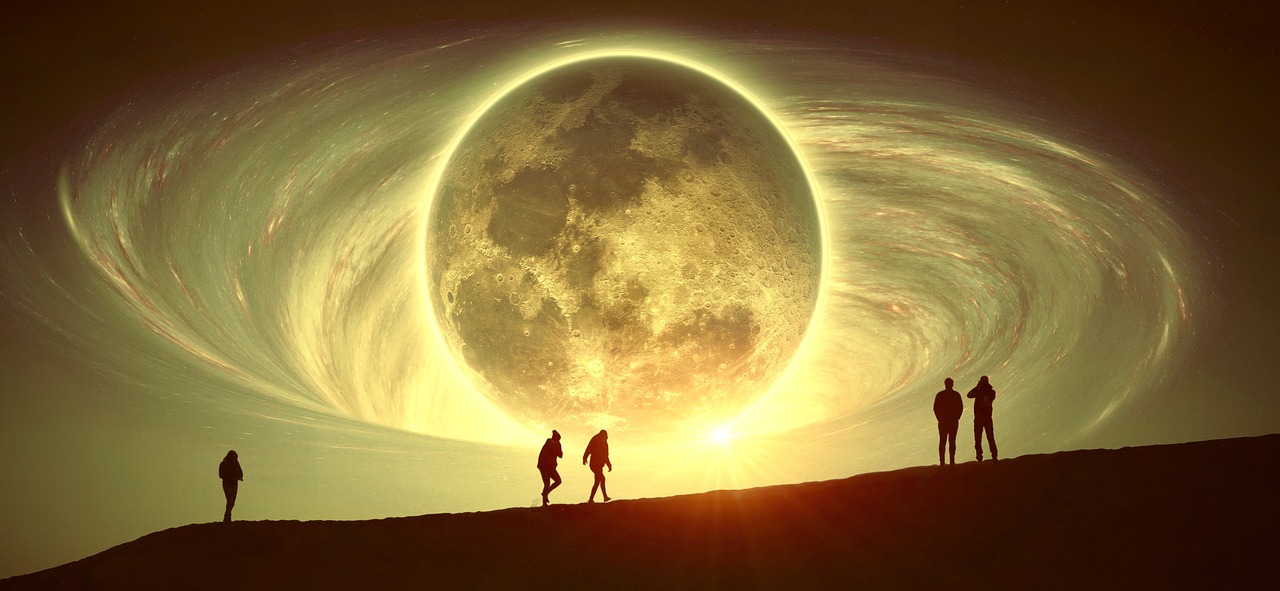
Ethical Implications
The intersection of science and religion raises profound that resonate deeply within our society. At the heart of this discussion lies the question: what guides our moral compass? Science, with its empirical approach, often seeks to understand the world through observation and experimentation, providing a framework for ethical reasoning based on evidence and outcomes. On the other hand, religion offers a different lens, one shaped by faith, tradition, and spiritual experiences that inform moral values.
To illustrate this dynamic, consider how both domains tackle issues such as biomedical ethics, environmental stewardship, and social justice. For instance, in the realm of biomedical ethics, scientific advancements like genetic engineering and cloning pose significant moral questions. Should we manipulate genes to eliminate diseases, or does this cross an ethical line? Here, science provides the technical capabilities, while religion often offers the moral frameworks that guide our decisions. The clash between the potential benefits of scientific progress and the ethical concerns raised by religious teachings can lead to intense debates.
Moreover, ethical considerations in science often revolve around the consequences of technological advancements. The development of artificial intelligence, for example, brings forth questions about responsibility and accountability. If an AI system makes a decision that leads to harm, who is to blame? Is it the scientist who created it, the programmer who wrote its code, or the institution that deployed it? These questions illustrate the need for a robust ethical framework that can bridge the gap between scientific innovation and religious moral teachings.
In contrast, religion often emphasizes the importance of community, compassion, and the intrinsic value of human life. Many religious teachings advocate for caring for the less fortunate and protecting the environment, principles that align with certain scientific pursuits, such as sustainability and public health. The ethical implications of these teachings can inspire scientific endeavors aimed at improving human welfare and environmental conservation.
To further explore the ethical implications of science and religion, we can look at some key areas where their principles intersect:
- Human Rights: Both science and religion advocate for the dignity and rights of individuals, though they may approach these concepts differently.
- Environmental Ethics: The responsibility to care for the Earth is a shared concern, with science providing data on ecological impacts and religion emphasizing stewardship.
- Medical Ethics: Decisions regarding life, death, and the quality of life often require input from both scientific understanding and religious beliefs.
Ultimately, the ethical implications of the science-religion dynamic are not just theoretical; they have real-world consequences that affect policies, laws, and our daily lives. As we navigate this complex landscape, it is crucial to foster dialogue between the two realms. By doing so, we can create a more comprehensive understanding of ethics that honors both our scientific advancements and our spiritual values.
As we continue to explore the relationship between science and religion, it's essential to recognize that the conversation is ongoing. The ethical implications we face today will evolve as our understanding deepens and as new challenges arise. So, how do we strike the right balance between scientific progress and ethical responsibility? This question remains at the forefront of our collective inquiry.
- What are the main ethical concerns regarding scientific advancements? Ethical concerns often revolve around the implications of new technologies, including issues of consent, privacy, and the potential for harm.
- How do science and religion differ in their approach to ethics? Science typically relies on empirical evidence and outcomes, while religion often draws on spiritual teachings and moral frameworks.
- Can science and religion coexist in ethical discussions? Yes, many believe that integrating perspectives from both realms can lead to a more holistic understanding of ethical issues.

Conflict and Compatibility
The relationship between science and religion often seems like a battleground, where the two fields are pitted against each other in an endless clash. But is it really that simple? While there are certainly moments where scientific discoveries have directly challenged religious beliefs, it's essential to delve deeper and explore the nuances of this complex relationship. At the heart of the debate lies a question that has puzzled thinkers for centuries: Can science and religion coexist, or are they fundamentally at odds with each other?
On one hand, numerous scientific breakthroughs have indeed posed significant challenges to traditional religious views. For instance, the theory of evolution presented by Charles Darwin in the 19th century fundamentally altered our understanding of the origins of life. Many religious interpretations of creation were thrown into disarray, leading to heated debates and, in some cases, outright conflict. Similarly, the heliocentric model proposed by Copernicus, which placed the sun at the center of the solar system, contradicted the long-held belief that the Earth was the focal point of the universe, a notion deeply rooted in religious doctrine.
However, it’s crucial to recognize that not all scientists view their work as contradictory to their faith. In fact, many prominent scientists have been deeply religious individuals who saw their scientific endeavors as a way to understand the divine. This perspective fosters a sense of compatibility, suggesting that science can actually enrich religious belief rather than dismantle it. For instance, physicist and theologian John Polkinghorne argues that scientific inquiry and religious faith can complement each other, providing a fuller picture of reality.
To further illustrate this compatibility, consider the following points:
- Common Goals: Both science and religion seek to answer profound questions about existence, purpose, and the nature of reality.
- Dialogue Opportunities: Engaging in discussions about ethics, morality, and the implications of scientific discoveries can enhance both fields.
- Personal Experience: Many individuals find that their spiritual experiences inform their scientific understanding, leading to a more holistic worldview.
Moreover, the emergence of integrative approaches highlights a growing trend among thinkers who advocate for a harmonious relationship between science and religion. This perspective promotes the idea that both domains can coexist and even thrive together. By fostering dialogue and understanding, proponents of this view argue that we can leverage the strengths of both fields to address pressing global challenges, such as climate change and social justice.
In conclusion, while the historical context of science and religion is marked by conflict, it is essential to recognize the potential for compatibility and mutual enrichment. By embracing the complexities of this relationship, we can cultivate a more nuanced understanding that transcends simplistic binaries. As we continue to explore the universe through the lens of science, let us not forget the profound questions of meaning and purpose that religion seeks to address. After all, the quest for knowledge is a journey best undertaken together.
Q1: Can science and religion coexist?
A1: Yes, many believe that science and religion can coexist and complement each other by addressing different aspects of human experience.
Q2: What are some examples of conflicts between science and religion?
A2: Key examples include the debates surrounding evolution vs. creationism and the heliocentric model of the solar system.
Q3: Are there scientists who are also religious?
A3: Absolutely! Many scientists, including notable figures like Albert Einstein and Francis Collins, identify as religious and see no conflict between their faith and scientific work.
Q4: How can dialogue between science and religion be fostered?
A4: Encouraging open discussions, interdisciplinary studies, and educational initiatives can help bridge the gap between science and religion.

Scientific Discoveries Challenging Beliefs
The relationship between science and religion has often been a turbulent one, with numerous scientific discoveries shaking the very foundations of religious beliefs. As humanity has progressed, our understanding of the universe has expanded, often contradicting traditional religious narratives. For instance, the theory of evolution, proposed by Charles Darwin in the 19th century, presented a naturalistic explanation for the diversity of life that challenged the creationist views held by many religious groups. This theory suggested that species evolve over time through a process of natural selection, which led to heated debates between scientists and religious leaders.
Another significant scientific breakthrough was the heliocentric model of the solar system, championed by Nicolaus Copernicus and later supported by Galileo Galilei. This model posited that the Earth revolves around the Sun, contrary to the long-held belief that the Earth was the center of the universe. Such revelations not only transformed our understanding of astronomy but also posed serious questions about the literal interpretations of religious texts that suggested otherwise. The infamous trial of Galileo is a prime example of how scientific inquiry can clash with religious doctrine, leading to a conflict that resonates to this day.
Moreover, the advent of modern physics, particularly Albert Einstein's theory of relativity, has further complicated the dialogue between science and religion. Einstein's work challenged the notion of absolute time and space, concepts that had been deeply ingrained in various religious frameworks. As scientists continued to uncover the complexities of the universe, questions arose about the nature of existence, the beginning of time, and even the possibility of a multiverse. These discoveries force us to reconsider not only our scientific understanding but also our philosophical and theological perspectives.
It is important to recognize that these scientific discoveries do not inherently disprove religious beliefs; rather, they invite a reevaluation of how we interpret our world. Some religious adherents have found ways to reconcile their faith with scientific findings, suggesting that both realms can coexist and even complement one another. For instance, many believe that God could work through the processes of evolution, viewing science as a means to understand the divine creation rather than a direct contradiction to it. This perspective fosters a dialogue that encourages the integration of faith and reason, rather than viewing them as opposing forces.
In summary, scientific discoveries have undeniably challenged traditional religious beliefs, prompting both conflict and dialogue. The ongoing conversation between science and religion continues to evolve, as new discoveries emerge and as society grapples with the implications of these findings. As we navigate this complex landscape, it is essential to approach the discussion with an open mind, recognizing that the quest for knowledge can enrich both our scientific understanding and our spiritual beliefs.
- How has the theory of evolution impacted religious beliefs? The theory of evolution has led to significant debates within religious communities, prompting discussions about the interpretation of creation narratives in religious texts.
- What was the significance of Galileo's trial? Galileo's trial highlighted the tension between scientific inquiry and religious authority, marking a pivotal moment in the history of science and religion.
- Can science and religion coexist? Many believe that science and religion can coexist, with each offering unique insights into the nature of existence and the universe.
- How do modern physicists view the concept of God? Views vary widely among physicists; some see no conflict between their scientific work and belief in God, while others adopt a more secular perspective.

Integrative Approaches
In a world where science and religion often appear to be at odds, many thinkers are advocating for that seek to harmonize these two realms of human understanding. Instead of viewing science and religion as opposing forces, these perspectives suggest that they can coexist and even enrich one another. Imagine standing at the crossroads of two powerful rivers, each flowing with its own unique currents; when they converge, they create a more robust stream that carries the wisdom of both.
One of the key arguments for integration is that both science and religion address fundamental questions about existence, purpose, and the universe. While science provides us with empirical data and theories about how the world works, religion offers insights into the meaning and significance of our experiences. This duality can lead to a more comprehensive understanding of reality that acknowledges both the material and the spiritual.
For instance, consider the concept of theistic evolution, which posits that God uses the process of evolution as a means of creation. This viewpoint allows individuals to embrace scientific explanations for the diversity of life while maintaining a belief in a higher power that imbues that process with purpose. Such integrative perspectives encourage dialogue and collaboration between scientists and theologians, fostering an environment where questions can be explored without the constraints of dogma.
Moreover, integrative approaches can be seen in various educational initiatives that aim to bridge the gap between science and religion. These programs often emphasize critical thinking and encourage students to explore the intersections of these fields. By promoting an understanding that both science and religion can contribute to a more profound comprehension of the universe, we can cultivate a generation that values both empirical inquiry and spiritual reflection.
In addition, many contemporary thinkers argue that the integration of scientific and religious perspectives can lead to practical benefits in addressing global challenges. Issues such as climate change, social justice, and public health require a multifaceted approach that encompasses scientific knowledge and ethical considerations rooted in religious teachings. For example, many religious organizations are now engaging in environmental stewardship, drawing upon their moral frameworks to advocate for sustainable practices. This collaboration not only enhances the effectiveness of initiatives but also fosters a sense of community and shared responsibility.
Ultimately, the challenge lies in fostering an atmosphere where open dialogue can flourish. Integrative approaches encourage individuals to ask questions and seek answers that encompass both scientific inquiry and spiritual exploration. By doing so, we can move beyond the binary thinking that often characterizes the science-religion debate and work towards a more nuanced understanding of our existence.
As we continue to navigate the complexities of life, recognizing the potential for integration between science and religion could lead to a richer, more fulfilling understanding of ourselves and the universe. After all, isn't the pursuit of knowledge and meaning a journey worth taking together?
- What are integrative approaches? Integrative approaches refer to perspectives that seek to harmonize science and religion, suggesting they can coexist and enrich one another.
- Can science and religion coexist? Yes, many thinkers advocate for the idea that science and religion can complement each other by addressing different aspects of human experience.
- What is theistic evolution? Theistic evolution is the belief that God uses the process of evolution as a means of creation, allowing for a synthesis of scientific and religious views.
- How can education promote integration? Educational initiatives that encourage dialogue between science and religion can help students explore the intersections of both fields and foster critical thinking.
- What are the benefits of integrating science and religion? Integrating these perspectives can lead to practical solutions for global challenges and promote a deeper understanding of both the material and spiritual aspects of life.

Impact on Society
The interplay between science and religion has a profound impact on society, influencing everything from cultural values to public policy. In a world that is increasingly driven by technological advancements and scientific discoveries, the tension between these two domains often shapes our collective worldview. For instance, scientific breakthroughs in fields like medicine and environmental science have not only transformed our understanding of health and nature but have also raised ethical questions that resonate deeply within religious communities.
Consider how the advent of genetic engineering and cloning has sparked debates among religious groups about the sanctity of life. These discussions are not merely academic; they have real-world implications that affect legislation and healthcare practices. As society grapples with these complex issues, the dialogue between science and religion becomes crucial. It encourages us to reflect on our ethical frameworks and the moral dimensions of our choices.
Moreover, the science-religion debate significantly influences education. In many regions, the teaching of evolution versus creationism remains a contentious issue in schools. This not only affects what students learn about the origins of life but also shapes their critical thinking skills and understanding of scientific inquiry. The challenge lies in finding a balance that respects both scientific integrity and religious beliefs, fostering an environment where students can explore these ideas without feeling alienated.
To illustrate the societal impact of this debate, let’s look at some key areas:
| Area of Impact | Scientific Influence | Religious Influence |
|---|---|---|
| Healthcare | Advancements in medical technology and treatments | Ethical considerations regarding end-of-life care |
| Environmental Policies | Scientific research on climate change | Religious calls for stewardship of the Earth |
| Education | Curriculum development based on scientific principles | Debates on teaching creationism vs. evolution |
In addition to these areas, the influence of religion within the scientific community cannot be overlooked. Many scientists hold personal beliefs that shape their perspectives and motivations. For example, some researchers may be driven by a sense of purpose that aligns with their spiritual values, leading them to pursue scientific inquiries that address social justice issues or environmental concerns. This interplay creates a rich tapestry of thought where science and religion can coexist and even enrich one another.
Ultimately, the impact of the science-religion debate on society is multifaceted. It challenges us to navigate a world where empirical knowledge and spiritual beliefs intersect, prompting ongoing discussions about ethics, morality, and our collective future. By engaging with these conversations, we can foster a more inclusive society that values both scientific inquiry and religious insight, paving the way for a nuanced understanding of the human experience.
- How do science and religion differ in their approaches to knowledge? Science relies on empirical evidence and experimentation, while religion often emphasizes faith and spiritual experience.
- Can science and religion coexist? Yes, many individuals and thinkers advocate for a dialogue that respects both domains, finding ways to integrate scientific understanding with spiritual beliefs.
- What role does education play in the science-religion debate? Education shapes how scientific principles and religious beliefs are taught, influencing public perception and understanding of both fields.
- Are there notable scientists who are also religious? Yes, many prominent scientists hold religious beliefs and have contributed to discussions on the compatibility of science and faith.

Education and Science
Education plays a pivotal role in shaping our understanding of science and its relationship with religion. In today's world, where information is at our fingertips, the way we educate ourselves about scientific principles can greatly influence our perceptions of religious beliefs. It's fascinating to consider how science education can either challenge or reinforce faith. For instance, when students learn about the scientific method, they are taught to prioritize empirical evidence and critical thinking. This approach can lead to questions about traditional religious narratives, prompting some to reevaluate their beliefs. But is this a bad thing? Not necessarily!
In fact, many educators argue that a comprehensive science education should include discussions about the philosophical implications of scientific discoveries, including their ethical dimensions. Integrating these discussions into the curriculum can foster a more nuanced understanding of how science and religion can coexist. For example, when discussing evolution, educators can present it not just as a scientific theory but as a topic that has significant cultural and religious implications. This dual approach encourages students to think critically and develop their own perspectives rather than simply accepting one viewpoint.
Moreover, the impact of science education extends beyond the classroom. It shapes public discourse and influences societal norms. When communities prioritize science education, they often see a ripple effect in policy-making and cultural attitudes. For example, regions that emphasize STEM (Science, Technology, Engineering, and Mathematics) education tend to have more progressive views on issues like climate change and healthcare. This shift can create a more informed public that is better equipped to engage in discussions about the ethical implications of scientific advancements.
However, the relationship between education and science is not without its challenges. In some areas, particularly where religious beliefs are deeply rooted, science education can be met with resistance. This tension often leads to debates over curriculum content, such as the inclusion of evolution versus creationism. In these instances, educators must navigate a delicate balance between respecting cultural beliefs and providing a robust scientific framework. Creating an open dialogue that respects both perspectives can be key to fostering understanding and acceptance.
To illustrate the importance of science education in bridging the gap between science and religion, consider the following table that outlines various educational approaches:
| Approach | Description | Potential Benefits |
|---|---|---|
| Integrated Curriculum | Combines science education with discussions of philosophical and ethical implications. | Encourages critical thinking and a holistic understanding of complex issues. |
| Community Engagement | Involves local communities in educational initiatives, fostering dialogue between science and religion. | Builds trust and promotes a collaborative learning environment. |
| Interdisciplinary Studies | Encourages exploration of science through the lens of humanities and social sciences. | Provides a richer context for understanding the impact of scientific discoveries on society. |
In conclusion, the intersection of education and science is a dynamic space that holds the potential for both conflict and harmony. By fostering an environment where students can explore these ideas openly, we can cultivate a generation that appreciates the complexity of human understanding. Ultimately, the goal should be to encourage curiosity and respect, allowing individuals to navigate their own paths between scientific inquiry and spiritual belief.
- How can science education influence religious beliefs?
Science education encourages critical thinking and evidence-based reasoning, which can lead individuals to question traditional beliefs. - Can science and religion coexist?
Yes, many people find ways to harmonize their scientific understanding with their religious beliefs, seeing them as complementary rather than conflicting. - What role does ethics play in science education?
Ethics is crucial in science education as it guides students in considering the broader implications of scientific discoveries on society and humanity.

Religion in the Scientific Community
When we think of the scientific community, the image that often comes to mind is one of rationality, logic, and empirical evidence. However, it's important to recognize that this community is not monolithic; it is composed of individuals with diverse backgrounds, beliefs, and values. Surprisingly, a significant number of scientists identify with various religious traditions, and their faith can profoundly influence their work and worldview.
Many people might assume that a commitment to science necessitates a rejection of religious beliefs. Yet, history tells a different story. Figures such as Gregor Mendel, the father of genetics, and Georges Lemaître, who proposed the Big Bang theory, were devoutly religious. Their faith did not impede their scientific inquiry; rather, it often provided them with a sense of purpose and ethical grounding. This intertwining of faith and science can lead to a unique perspective where both realms inform one another.
For some scientists, religion offers a framework to explore the ethical implications of their work. Issues like genetic engineering, artificial intelligence, and climate change raise profound moral questions that science alone may not adequately address. Here, religious beliefs can guide scientists in making ethical decisions that consider not just the scientific outcomes, but also the broader impact on humanity and the planet. This perspective is crucial in fostering a responsible approach to scientific advancements.
However, the relationship between religion and science is not without its challenges. There are instances where religious beliefs may conflict with scientific findings. For example, debates surrounding evolution and creationism often highlight the tension between certain religious doctrines and scientific consensus. In these cases, scientists who hold religious beliefs may find themselves in a complex position, navigating between their faith and the empirical evidence that contradicts literal interpretations of religious texts.
Despite these challenges, many scientists advocate for a dialogue that respects both scientific inquiry and religious belief. They argue that rather than viewing science and religion as opposing forces, we should consider them as complementary avenues for understanding our existence. This integrative approach fosters a more holistic view of knowledge, encouraging collaboration between disciplines and promoting a richer dialogue about the nature of reality.
In recent years, organizations such as BioLogos have emerged, aiming to bridge the gap between faith and science. These groups emphasize that one can embrace scientific discoveries without abandoning one's religious beliefs. They provide a platform for scientists to share their experiences and insights, demonstrating that faith and science can coexist harmoniously.
Moreover, the presence of religious scientists in the academic sphere serves as a reminder that the pursuit of knowledge is a deeply human endeavor, shaped by our experiences, beliefs, and values. Their contributions not only advance scientific understanding but also enrich the cultural dialogue surrounding science and religion, encouraging a more nuanced appreciation of both realms.
In conclusion, the scientific community is not devoid of religion; rather, it is a tapestry woven with diverse threads of belief. As we continue to explore the mysteries of the universe, it is essential to recognize the role that faith can play in shaping scientific inquiry and ethical considerations. Embracing this complexity allows for a more profound understanding of both science and religion, ultimately enriching our collective pursuit of knowledge.
- Can a scientist be religious? Yes, many scientists identify with various religious beliefs and find ways to integrate them with their scientific work.
- How do religious beliefs influence scientific research? Religious beliefs can provide ethical frameworks and a sense of purpose, guiding scientists in their research and decision-making processes.
- Are there conflicts between science and religion? Yes, conflicts can arise, particularly in areas like evolution versus creationism, but many advocate for dialogue and understanding between the two.
- What organizations support the integration of faith and science? Organizations like BioLogos work to promote the compatibility of scientific findings with religious beliefs.
Frequently Asked Questions
- What is the main conflict between science and religion?
The main conflict arises from differing approaches to understanding reality. Science relies on empirical evidence and observation, while religion often depends on faith and spiritual experiences. This fundamental difference can lead to disagreements over topics like evolution and the origins of the universe.
- Can science and religion coexist?
Absolutely! Many people find ways to harmonize their scientific understanding with their religious beliefs. Some argue that science explains how things work, while religion provides meaning and purpose. Integrative approaches advocate for dialogue between the two, promoting a richer understanding of both realms.
- How has the historical relationship between science and religion evolved?
Historically, science and religion were often intertwined, with many early scientists being deeply religious. However, significant events like the Galileo affair and the Scopes Trial highlighted tensions. Over time, the relationship has fluctuated, with periods of conflict and cooperation shaping modern perspectives.
- What role does faith play in religion compared to empirical evidence in science?
Faith is central to religion, providing a framework for beliefs that may not require empirical validation. In contrast, science prioritizes empirical evidence, relying on observation and experimentation to validate theories. This difference in validation methods often leads to disputes over various topics.
- How do scientific discoveries challenge traditional religious beliefs?
Scientific discoveries, such as the theory of evolution or the Big Bang, can challenge literal interpretations of religious texts. These findings prompt believers to reevaluate their understanding of creation and existence, leading to a spectrum of responses from rejection to reinterpretation of faith.
- What impact does the science-religion debate have on society?
The debate influences societal norms, education, and cultural values. For instance, discussions around science education in schools can affect public perception of religious beliefs. The interplay between science and religion shapes policies and societal attitudes toward various issues, including healthcare and environmental ethics.
- Are there notable scientists who are also religious?
Yes, many scientists maintain religious beliefs while contributing significantly to their fields. Figures like Francis Collins, who led the Human Genome Project, openly discuss their faith, demonstrating that one can navigate both scientific inquiry and spiritual belief without conflict.

